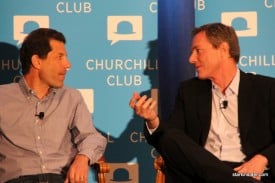
When I saw former Palm CEO, then HP WebOS ringmaster, Jon Rubinstein at a wireless tech event last December here in Silicon Valley he didn’t strike me as pumped up about the prospects of his baby.
Palm had been purchased for $1.2B in early 2010 and folded into the HP engineering machine. But instead of being supercharged, over-confident, and brimming with pride, he sat with a slouch, and appeared defeated. Maybe he’s just a mellow guy. Still, I thought, this was no way to lead the charge — especially not against the uber competitive, smash-mouth Apple and Google. Notably absent: “This is Sparta!”
In retrospect, after the news yesterday that HP would abruptly pull the plug on WebOS (the least surprising thing I’ve heard all year), and cede the battle before it had really begun, it all makes sense.
Rubenstein never had a chance.
It was mission impossible.
When it comes to the modern day mobile OS wars, there is only room for two at the top. And that die has been cast. That probably explains why Rubenstein was more passionate reminiscing about the early days of Palm, then he was leading the troops at HP into battle. Lemmings were them. Just ask Best Buy, who’s sitting on a crapload of unsold TouchPads.
Part of the problem is the engineering-centric culture of HP, and the fact that its management is still in turmoil, reeling from years of abrupt changes in strategy.
But the other issue was one of market position. There simply is no room for a large, third player in this space. At least not with significant share — I’m convinced MSFT will be a niche player.
Apple brings a vertically integrated system to the market. That allows it to control the end-to-end user experience. Design is the competitive differentiator. Likewise it can command a price premium.
Google is now attempting to copy Apple in its bold acquisition of Motorola. But its trump card is openness. A variety of manufacturers flood the market with Android and compete on price.
Where does that leave HP?
Sure, WebOS is (was) slick. Yet again, though, we learn that products and features do not win the day.
In the end HP got squeezed. Lenovo knows better, and is licensing Android. RIM is on death watch. It’s a bloody playing field.
To recap:
Desktop OS wars of the 80s/90s: MICROSOFT vs. APPLE
Mobile OS wars of the 21st century: GOOGLE vs. APPLE

